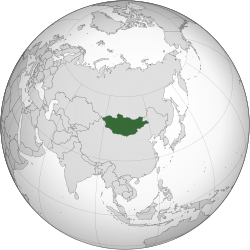
Back Монголиа Abkhazian Mongolia ACE Монголие ADY Mongolië Afrikaans Mongolei ALS ሞንጎልያ Amharic Mongolia AMI Mongolia AN Mongolland ANG मंगोलिया ANP
Mongolia | |
|---|---|
Anthem:
| |
 Location of Mongolia (green) | |
| Capital and largest city | Ulaanbaatar[a] 48°N 106°E / 48°N 106°E |
| Official languages | Mongolian |
| Official scripts | |
| Ethnic groups (2010) | |
| Religion | Buddhism (53%) Non-religious (38.6%) Islam (3%) Shamanism (2.9%) Christianity (2.2%) Others (0.4%)[2] |
| Demonym(s) | |
| Government | Unitary semi-presidential republic[3][4][5] |
| Ukhnaagiin Khürelsükh | |
| Luvsannamsrain Oyun-Erdene | |
| Gombojavyn Zandanshatar | |
| Legislature | State Great Khural |
| Formation | |
| formed 209 BC | |
| formed 1206 | |
• Independence declared from the Qing dynasty | December 29, 1911 |
| November 26, 1924 | |
• Independence recognized by the Republic of China | January 5, 1946 |
| February 13, 1992 | |
| Area | |
• Total | 1,566,000 km2 (605,000 sq mi) (18th) |
• Water (%) | 0.67[2] |
| Population | |
• 2020 estimate | 3,353,470[6] (136th) |
• 2023 census | 3,057,778[7] |
• Density | 2.07/km2 (5.4/sq mi) (194th) |
| GDP (PPP) | 2019 estimate |
• Total | $47 billion[8] (115th) |
• Per capita | $14,270[8] (93rd) |
| GDP (nominal) | 2019 estimate |
• Total | $13.7 billion[8] (133rd) |
• Per capita | $4,151[8] (116th) |
| Gini (2018) | 32.7[9] medium |
| HDI (2018) | high · 92nd |
| Currency | Tögrög (MNT) |
| Time zone | UTC+7/+8[11] |
| Date format | yyyy.mm.dd (CE) |
| Driving side | right |
| Calling code | +976 |
| ISO 3166 code | MN |
| Internet TLD | .mn, .мон |
| |
Mongolia is a landlocked country in East Asia and Central Asia. It borders Russia to the north and the People's Republic of China to the south, east and west. Mongolia's political system is a parliamentary republic.
Until recently, most of the people there were Buddhists. Many of them are nomads (people who always move from place to place and do not stay in one home), but this is changing. The largest city, and capital city is Ulaanbaatar. It is where about 38% of the population live. This has been spelled Ulan Bator/ Ulaan Battor and other ways in the past. The north and east parts of the country have many mountains. Part of the south part is the Gobi Desert. There are 2,791,272 people living in Mongolia. The country is the 18th biggest country in the world, with an area of 1,564,116 km2 (603,909 sq mi).
Mongolia is mainly rural with the lowest population density of all independent countries in the world.[12][13][14][note 1]
- ↑ "Official Documents to be in Mongolian Script". UB Post. June 21, 2011. Archived from the original on November 1, 2011. Retrieved July 11, 2010.
- ↑ 2.0 2.1 2.2 "Mongolia". The World Factbook. CIA. Archived from the original on July 3, 2015. Retrieved August 9, 2015.
- ↑ Shugart, Matthew Søberg (September 2005). "Semi-Presidential Systems: Dual Executive and Mixed Authority Patterns" (PDF). Graduate School of International Relations and Pacific Studies. Archived from the original (PDF) on August 19, 2008. Retrieved February 21, 2016.
- ↑ Shugart, Matthew Søberg (December 2005). "Semi-Presidential Systems: Dual Executive And Mixed Authority Patterns" (PDF). French Politics. 3 (3): 323–351. doi:10.1057/palgrave.fp.8200087. ISSN 1476-3419. S2CID 73642272. Archived (PDF) from the original on March 4, 2016. Retrieved February 21, 2016.
Even if the president has no discretion in the forming of cabinets or the right to dissolve parliament, his or her constitutional authority can be regarded as 'quite considerable' in Duverger's sense if cabinet legislation approved in parliament can be blocked by the people's elected agent. Such powers are especially relevant if an extraordinary majority is required to override a veto, as in Mongolia, Poland, and Senegal.
- ↑ Odonkhuu, Munkhsaikhan (February 12, 2016). "Mongolia: A Vain Constitutional Attempt to Consolidate Parliamentary Democracy". ConstitutionNet. International IDEA. Archived from the original on February 25, 2016. Retrieved February 21, 2016.
Mongolia is sometimes described as a semi-presidential system because, while the prime minister and cabinet are collectively responsible to the SGKh, the president is popularly elected, and his/her powers are much broader than the conventional powers of heads of state in parliamentary systems.
- ↑ "Renewed 2015-2045 population projection". www.1212.mn. Mongolian Statistical Information Service. January 1, 2017. Retrieved May 28, 2020.
- ↑ "2015 population and housing by census of mongolia". www.1212.mn. Mongolian Statistical Information Service. January 1, 2016. Retrieved May 28, 2020.
- ↑ 8.0 8.1 8.2 8.3 "World Economic Outlook Database, January 2019". IMF.org. International Monetary Fund. Retrieved February 24, 2019.
- ↑ "GINI index (World Bank estimate) - Mongolia". data.worldbank.org. World Bank. Retrieved March 22, 2020.
- ↑ "Human Development Report 2019". United Nations Development Programme. December 10, 2019. Archived from the original (PDF) on May 16, 2020. Retrieved December 10, 2019.
- ↑ "Mongolia Standard Time is GMT (UTC) +8, some areas of Mongolia use GMT (UTC) +7". Time Temperature.com. Archived from the original on October 13, 2007. Retrieved September 30, 2007.
- ↑ Department of Economic and Social Affairs Population Division (2009). "World Population Prospects, Table A.1" (PDF). 2008 revision. United Nations. Retrieved March 12, 2009.
{{cite journal}}: Cite journal requires|journal=(help) - ↑ "Population density (people per km2 of land area)". The World Bank. Retrieved May 2, 2012.
- ↑ "Population of all countries from largest to smallest". World Atlas. Retrieved May 2, 2012.
<ref group=note> tags on this page, but the references will not show without a {{reflist|group=note}} template (see the help page).

